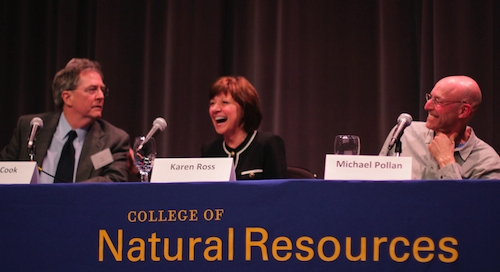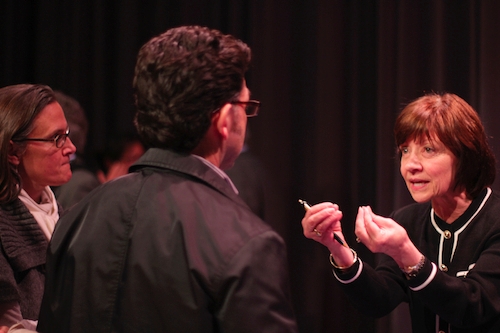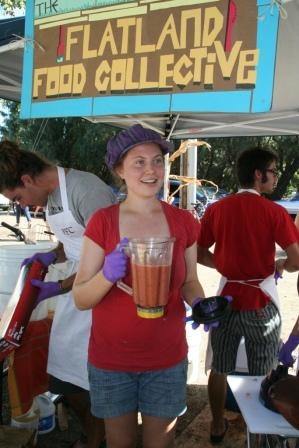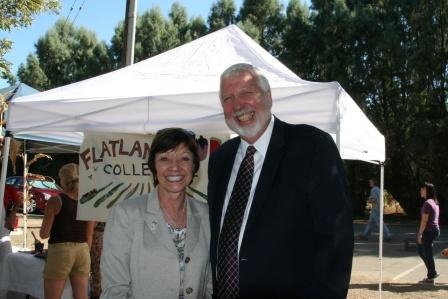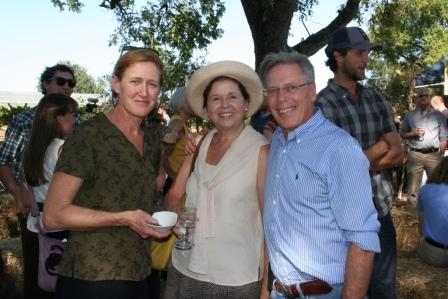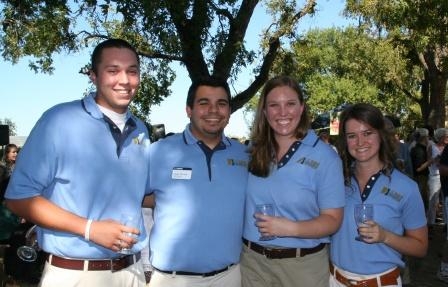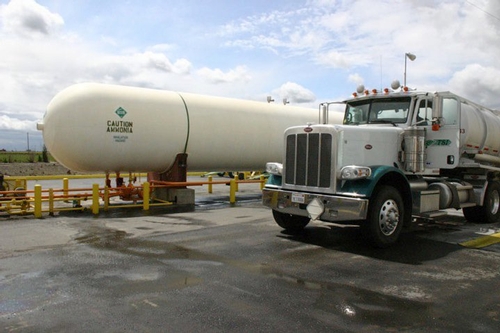Posts Tagged: agricultural sustainability
World Food Center at UC Davis will tackle global issues
When you think casually of “food,” you may think of your next meal or your favorite food. “World food” may broaden your thinking to include international cuisines, global hunger, or a growing population. But the academic fields related to food are numerous. Food is one of life’s basic necessities, and along with its associated issues it is essential to the health and well-being of everyone, whatever their locale, education, or income level.
The new World Food Center at UC Davis will take on a broad purview related to food, including sustainable agricultural and environmental practices, food security and safety, hunger, poverty reduction through improved incomes, health and nutrition, population growth, new foods, genomics, food distribution systems, food waste, intellectual property distribution related to food, economic development and new technologies and policies.
With rapid global population growth occurring on smaller amounts of arable land, coupled with the expected impacts of climate change on food production, understanding the sustainability of food into the future is critical.
The new center’s website notes, “The World Food Center at UC Davis takes a ‘big picture’ approach to sustainably solving humanity’s most pressing problems in food and health. By bringing together world-class scientists with innovators, philanthropists and industry and public leaders, the center will generate the kind of visionary knowledge and practical policy solutions that will feed and nurture people for decades to come.”
In establishing the World Food Center, UC Davis Chancellor Linda Katehi said, “We did this to fully capitalize on our depth and expertise as the world’s leading university for education, research and scholarship on all aspects of food, but especially the nexus between food and health.”
UC Davis is the top-ranked agricultural university in the world, and California is the major producer of vegetables and fruit in the nation. Tom Tomich, director of the Agricultural Sustainability Institute and professor in the Department of Environmental Science and Policy at UC Davis, says of the World Food Center’s location at UC Davis, “There’s no place else that has the right mix of educational programs, research facilities, and the engagement with the state.”
The major academic disciplines surrounding food are found at UC Davis — agriculture, the environment, medicine, veterinary medicine, engineering, social and cultural sciences, and management. More than 30 centers and institutes at UC Davis will be pulled together through the World Food Center. The combination of scholarship, leadership, and partnerships at UC Davis has already established the campus as a center for food-related science and outreach. This new center will reinforce that strength and broaden the university’s ability to tackle tough global issues related to food.
Although the founding director of the center has yet to be named, Josette Lewis, Ph.D., was recently appointed as the associate director of the World Food Center. Her background on international research and development for the U.S. Agency for International Development, and director of its Office of Agriculture, honed her skills to take on the World Food Center. It was at US AID that she worked on a major global hunger and food security initiative, establishing her expertise on issues related to global agricultural development and food security.
As the new World Food Center becomes fully developed, it will be well-positioned on campus to continue to solve the major global issues related to food that are a hallmark of UC Davis.
Additional information:
- World Food Center website
- UC Davis video on the World Food Center
- Key facts
- UC Davis Dateline article
- Sacramento Bee article
The U.S. Farm Bill: What's at stake?
The United States farm bill is up for renewal this year, and what goes into the $400 billion, 5,000-plus page piece of legislation will affect what tens of millions of Americans eat — and don’t eat — in the coming years. On April 5, UC Berkeley’s College of Natural Resources fired off an enlightening salvo in the public discourse, with a panel of heavy hitters calling on the public to let their voices be heard in the quest to, as panelist Karen Ross, Secretary of the California Department of Food and Agriculture, put it, “move farmers and eaters closer together.”
Looking at the bill’s history, it’s not surprising the two groups have been driven apart. The farm bill was implemented during the Great Depression in the 1930s in order to raise commodity prices and farmers’ incomes, said Gordon Rausser, UC Berkeley professor of agricultural and resource economics and the event’s moderator. The commodities it focused on — food grains, feed grains, dairy, tobacco and peanuts — became political powerhouses while much of the food on our dinner tables — fruits, vegetables, and nuts — were relegated to the category of “specialty crops.”
Broccoli and oranges … specialty crops? “That’s what we grow here in California,” Ross said. And that's what's on the U.S. Department of Agriculture’s food plate. In the past 15 years such growers have been taking a more active role in the farm bill to make sure they are not marginalized, she said.
Over eight decades the bill has morphed from a farm to a food bill, the panelists said. Seventy-seven percent of the bill now goes to support the federal Supplemental Nutritional Assistance Program (SNAP), the reinvention of the food stamps program.
Ken Hecht, just retired from his position as the director of the California Food Policy Advocates, reeled off some facts about the people who use SNAP:
- 50 percent are working households
- 93 percent are below the poverty level
- 50 percent of benefit recipients are children
- 75 percent are households with children
“There are 1.3 million children who are getting enough to eat because of this program,” Hecht said. “It avoids all those consequences of food insecurity that we all know about: lack of adequate nutrition, lack of adequate health, lack of academic opportunity and performance, lack of social development.” The program not only helps its participants, Hecht, said, but the rest of the people in the community as well.
In addition to SNAP, support for sustainable agriculture emerged as a theme of the presentation. For insight, In Defense of Food author and UC Berkeley journalism professor Michael Pollan offered the audience the perspective of a Martian: we Earthlings are now eating oil instead of eating sunlight. What he referred to as the “free lunch of photosynthesis” was swapped out, starting in the 1940s, for high-yield, industrialized farming that relies on pesticides, machines and giant feed-lots for animals. Pollan said that while farmers were enormously successful in achieving productivity goals, the environmental costs make agriculture second only to cars in fossil fuel production, and the producer of 20 to 30 percent of the country’s greenhouse gases. He recommends a simple criteria should be applied to every provision of the farm bill, from farmers market support to the SNAP program to obscure payment structures: “The question we should ask ourselves is, is this pushing agriculture back onto the sun or is it leaving it on the fossil fuel basis?” he said. “That’s the standard I think we need to apply.”
Ken Cook, president and co-founder of the Environmental Working Group, framed the issue in terms of dollars. “One cotton farmer in 2004 received $2 million. That’s the same amount of money we spent for the entire federal program devoted to organic agricultural research,” he said.
He emphasized the connection between good food practices and good environmental practices, and called SNAP EWG’s number one priority. “We’re trying to inject healthy eating into the farm bill as a legitimate concern of public policy,” he said. He cited a pilot healthy-snack program, in which evaluators noted students who had never seen a pineapple or celery or carrots before. “We should be spending billions of dollars on this program ... getting kids hooked on fruits and vegetables."
Cook pointed out that that much of what drives the farm bill is the politics of committee members securing subsidies for their home states, and conjured the specter of the recent pink-slime debacle to show how effective a little activism can be. Fail to get involved at your peril, Cook, said. “I guarantee you will get more of the same or worse.”
Pollan passed along advice from one of Cook’s staffers: “Simply calling your representative and saying you want more healthy food, you want more environmentally sustainable food, is all you need to do.”
The event was a presentation of the UC Berkeley College of Natural Resource's Spring 2012 Horace Albright Lecture in Conservation. Watch an hour and a half video of the presentations and Q&A:
Sustainable agriculture and food systems: An innovative new major at UC Davis
Two terms related to food production — “sustainability” and “food systems” — have been blended into a new major at the University of California, Davis. Sustainable Agriculture and Food Systems, the new undergraduate major, in some ways embodies a re-blossomed, student-driven interest in food production, akin to the organic farming movement of the 1970s.
Food systems is a broad term that addresses nutrition and health, sustainable agriculture, and community development. A food system encompasses the entire production chain, not only from farm to fork, but includes broader topics such as short- and long-term impacts on the environment, labor, management of food inputs (e.g., water, pesticides) and outputs (e.g., waste), and the socioeconomic impacts on communities engaged in the food system. In other words, food systems encompasses agricultural production within the broad context of environmental, economic, social, and political concerns.
Neal Van Alfen, dean of the College of Agricultural and Environmental Sciences at UC Davis, noted during the celebration ceremony for the new major, “Agriculture is incredibly knowledge intensive. It is as knowledge intensive as launching rockets.” He cited a terrarium as a model for how we must maintain a sustainable food production system with limited resources to feed a rapidly growing global population. “The planet is a closed system,” Van Alfen said. “We have to get it right.”
Professor Tom Tomich, master adviser for the major and director of the UC Davis Agricultural Sustainability Institute, said, “The major is about leadership, as much as it is about education. It’s about creating a new generation of leaders who will go on to guide the sustainability transformation for this country and for this planet.” Unlike student programs that are limited to classroom learning, Tomich said that the curriculum for the new major combines the best of three worlds — classroom and labs, the Student Farm, and the real world.
Karen Ross, Secretary of the California Department of Food and Agriculture, attended the opening, along with other high-level state leaders in agriculture, including Craig McNamara, president of the California State Board of Food and Agriculture, and Don Bransford, president of the UC President’s Advisory Commission on Agriculture and Natural Resources.
UC Davis chancellor Linda Katehi, who spoke about UC Davis’s national leadership in sustainability, noted, “This leadership from the state shows the importance of the program and what impact it may have on the state, on us as an institution, and on our students.”
“Agriculture and food have shaped human civilization and are central to well-being and health,” said Ralph Hexter, provost of UC Davis. “We recognize the need to understand both the natural world and our human activities holistically.” Addressing the global significance of the major, Hexter added, “Sustainable Agriculture and Food Systems is a major that is truly designed for the 21st century. It responds to today’s needs and incorporates experiential learning and state-of-the-art research.”
A recent UC Davis graduate who helped lay the groundwork for the curriculum, Maggie Lickter, spoke passionately to the 200 people celebrating the major. She said that the major is driven largely by students who have cutting-edge ideas and want to be engaged in creating a useful education. Lickter said that many students felt that components were missing from the traditional agricultural curriculum, such as farming practices grounded in an understanding of ecological systems, and the application of critical thinking skills to modern-day food systems.
In a moving tribute to the success of establishing the major, Lickter said, “This work can’t stop. If you stop stoking romance, love dissolves. If you stop tending a garden, plants wither. So we must stay committed to the evolution of this major.”
Dean Van Alfen, a strong proponent of UC Davis partnerships with the California agriculture industry, views this major as an additional way to create graduates with industry-ready work skills. Addressing UC Davis’s national and global leadership in agriculture, he said, “Agricultural sustainability has been a theme of this campus for a very long time. This new interdisciplinary major is the future in so many ways. It reflects our campus spirit and our culture. It will meet the needs of our stakeholders and the future of our planet.”
For more information:
- UC Green Blog
- Early press release
- UC Davis Student Farm
- UC Davis Agricultural Sustainability Institute
- About the major
What makes food grow - and why that matters
There’s a lot of attention paid to where food comes from nowadays. Less attention has been paid to what helps that food grow, but that’s an important part of the equation. Whether organic or conventionally grown, the tomatoes, lettuce, plums and other food we eat rely on nutrients in order to grow. One of the most important nutrients for plant productivity is nitrogen.
Nitrogen, which is ubiquitous in our atmosphere in a relatively inert, gaseous form, is not available to most plants unless it is transformed into a reactive form and added to soil, where plants can use it to grow. Most often nitrogen is applied to fields in the form of synthetic fertilizer, although organic production relies on other nitrogen sources, such as cover crops, manure, fish meal and poultry waste.
Agricultural production depends on nitrogen in order to grow reliable, high yielding crops. But this nitrogen, when it is applied to fields in the reactive form that plants can use, also tends to leak out into air and water and cause pollution when all the nitrogen applied to the field is not used up by the plants.
The California Nitrogen Assessment, a project of the Agricultural Sustainability Institute at UC Davis, is taking a hard look at the whole system of nitrogen use in California. While nitrogen is hugely important to producing the food and fiber that we all need, there may be ways to use it more efficiently and reduce the pollution problems it can cause. These problems include air and water pollution, which can have negative consequences for human and environmental health in California.
Since nitrogen is so important to producing the food that all of us eat, the Agricultural Sustainability Institute’s team has involved stakeholders from all around the agricultural system. The assessment team has sought insight from farmers and economists, policy makers and public health groups, and Californians whose drinking water has been polluted by nitrogen, forcing them to buy bottled water on a regular basis. There are many diverse perspectives and ideas about how nitrogen should be managed in California’s future. The assessment will provide a synthesis of the most up-to-date scientific knowledge on science, policy and practice to inform decision making on how to improve nitrogen management.
Thinking about where food comes from is one important part of understanding the food system. Learning about the trade-offs involved in other key agricultural inputs is another.
Find out more about nitrogen and the California Nitrogen Assessment at its website. If you are interested in becoming involved in the assessment as a stakeholder participant, visit the website for more information to learn how you can get involved.
What makes food nutritious?
Workers sort tomatoes at Russell Ranch
Part of our mission at the Agricultural Sustainability Institute at UC Davis is to ensure access to healthy food. So we’ve focused much of our work on the intersection between agriculture and human nutrition.
An interesting new field of study in this area looks at flavonoids, which are compounds in fruits and vegetables thought to have beneficial antioxidant effects and other medicinal value – they may even help reduce cancer risk.
Measuring the amount of flavonoids is one way we can figure out just how nutritious the food we’re eating really is.
At our Russell Ranch Sustainable Agriculture Facility, UC Davis Food Science professor Alyson Mitchell has looked at the relative nutrition of organic and conventional tomatoes by measuring flavonoid levels in samples from dried tomatoes over a 10-year period.
Aerial view of Russell Ranch Sustainable Agriculture Facility
She found that flavonoid content is greater in organic than conventional tomatoes, and the differences have increased with time. Over time, it also appears that an increase in flavonoid content is correlated with lower amounts of organic nitrogen application.
These results suggest that over-fertilization can result in lower flavonoid content – and a reduction in the health benefits of tomatoes. You can find out more about this research here.



